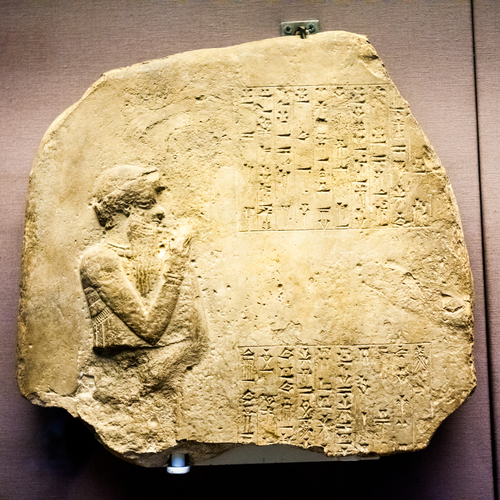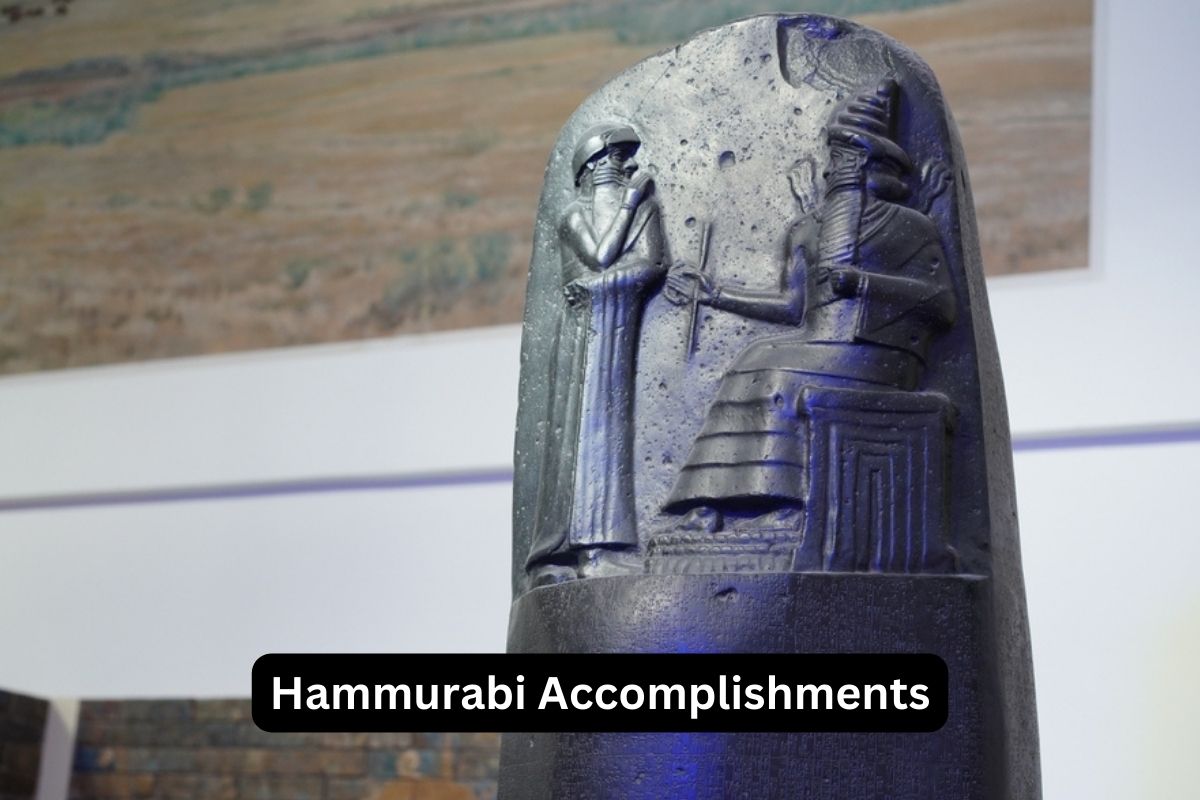Hammurabi, the sixth king of the First Babylonian Dynasty, ruled over ancient Mesopotamia from approximately 1792 BC to 1750 BC. His reign marked a significant period of development and achievement in the region.
Hammurabi is perhaps best known for his creation of the Code of Hammurabi, one of the earliest known legal codes in history, but his accomplishments extended beyond lawmaking.
His rule saw the centralization of government, economic reforms, irrigation projects, military conquests, cultural advancements, infrastructure development, the promotion of trade networks, legal reforms, and religious patronage.
These achievements left a profound and lasting impact on the society and culture of ancient Mesopotamia.
Accomplishments of Hammurabi
1. Code of Hammurabi
Hammurabi’s most famous accomplishment is the creation of the Code of Hammurabi, a comprehensive legal code that served as one of the earliest examples of written laws in human history.
This code consisted of 282 laws that addressed various aspects of daily life in ancient Babylon. It covered topics such as property rights, commerce, family matters, and criminal justice.
Also Read: Hammurabi Timeline
The Code of Hammurabi aimed to establish a just and orderly society by providing clear rules and guidelines for behavior. It also emphasized the principle of “an eye for an eye,” which means that punishments should be proportionate to the crimes committed.

2. Centralized Government
Hammurabi implemented a centralized system of government in Babylon. Under his rule, he appointed officials and governors to oversee different regions of his empire. This centralization allowed for more effective administration, tax collection, and enforcement of his laws.
It also helped maintain order and stability throughout his kingdom. By establishing a strong central authority, Hammurabi was able to exert control over a diverse and expanding territory.
3. Economic Reforms
Hammurabi recognized the importance of a thriving economy for the prosperity of his kingdom. To promote economic growth and fair trade, he implemented various economic reforms. One significant reform was the standardization of weights and measures.
Also Read: Hammurabi Facts
This ensured that merchants and traders used consistent units, reducing fraud and ensuring equitable trade. By regulating commerce and providing a stable economic environment, Hammurabi encouraged trade and helped to stimulate economic activity within his empire.
These reforms contributed to the overall well-being of his subjects and the growth of Babylon as a center of commerce and trade in the ancient world.
4. Irrigation Projects
Recognizing the importance of agriculture for his kingdom’s stability, Hammurabi initiated several irrigation projects. These projects involved the construction and maintenance of canals, dikes, and other infrastructure to control the flow of water from rivers like the Tigris and Euphrates.
By improving access to water for agricultural purposes, these efforts boosted crop yields and ensured a more stable food supply for his subjects. Irrigation projects played a crucial role in sustaining Babylon’s population and enhancing its agricultural productivity.
5. Military Achievements
Hammurabi expanded his empire through military campaigns, often employing a combination of diplomacy and force. He led his armies in various conquests, capturing neighboring cities and territories and bringing them under Babylonian control.
These military achievements not only expanded the borders of his kingdom but also solidified his reputation as a powerful ruler. Hammurabi’s military success was instrumental in maintaining order within his empire and protecting it from external threats.
6. Cultural Development
Under Hammurabi’s rule, Babylon became a vibrant center of culture and intellectual activity. The king’s patronage of scholars and scribes led to significant advancements in art, literature, and education.
Babylonian cuneiform script, one of the earliest known writing systems, saw further development during this period.
Literary works, including epic poems like the “Epic of Gilgamesh,” were composed or preserved during Hammurabi’s reign. These cultural achievements contributed to the lasting legacy of Babylon as a center of learning and creativity in ancient Mesopotamia.
7. Infrastructure Development
Hammurabi invested in the construction of various public infrastructure projects in Babylon. This included the building of temples, ziggurats, and defensive walls around the city.
Temples were not only centers of religious activity but also served as important economic and administrative hubs. Ziggurats, such as the famous Etemenanki ziggurat in Babylon, were colossal temple-towers that symbolized the connection between heaven and earth.
The defensive walls fortified the city, providing protection against external threats. These infrastructure projects contributed to the prosperity and grandeur of Babylon.
8. Trade Networks
Hammurabi actively promoted trade and diplomatic relations with neighboring regions and city-states. Through treaties and alliances, he established a network of trade partners, facilitating the exchange of goods, culture, and ideas.
Babylon’s strategic location along major trade routes, such as the Euphrates River, made it a crucial hub for commerce in ancient Mesopotamia. This trade network helped stimulate economic growth, enriching both Babylon and its trading partners.
9. Legal Reforms
In addition to the famous Code of Hammurabi, the king enacted other legal reforms that aimed to ensure fairness and justice within his kingdom. These reforms included provisions to protect the rights of vulnerable groups, such as widows and orphans.
They also addressed issues related to land ownership, debt, and contracts. Hammurabi’s legal reforms sought to maintain social order, protect individual rights, and establish a sense of justice that was crucial for the stability of his empire.
10. Religious Patronage
Hammurabi was a devout ruler who provided substantial support to Babylonian religious traditions. He sponsored the construction and renovation of temples dedicated to various deities, which were central to the spiritual life of the city and the kingdom.
This patronage solidified his image as a pious king and helped him maintain the support of the powerful priestly class. By honoring the gods and ensuring the well-being of their temples, Hammurabi reinforced the religious foundation of his rule and maintained the religious unity of his subjects
